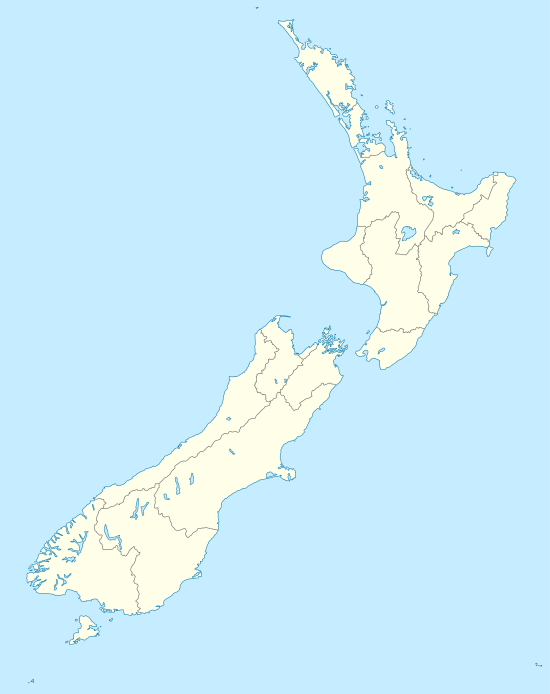Ngongotahā
Ngongotahā is a town on the western shores of Lake Rotorua in New Zealand's North Island. It is 10 kilometers northwest of Rotorua city, and is often regarded as an outer suburb of the larger centre. Its population was 4,107 in the 2013 census.[2]
Ngongotahā | |
|---|---|
Town | |
 Ngongotahā | |
| Coordinates: 38°4′59″S 176°12′00″E | |
| Country | |
| Region | Bay of Plenty |
| Territorial authority | Rotorua District |
| Ward | North |
| Area | |
| • Total | 12.91 km2 (4.98 sq mi) |
| Elevation | 286 m (938 ft) |
| Population (June 2019)[1] | |
| • Total | 4,850 |
| • Density | 380/km2 (970/sq mi) |
| Postcode | 3010 |
Its name is derived from a legend of Ihenga, the famous Māori explorer. It is said Ihenga met the Patu-paiarehe on Mount Ngongotahā and was offered a drink from a calabash. Ngongo means "to drink", and tahā means "calabash".[3] Ngongotahā is often referred to by locals as the "Sunny side of the Mountain".
History and culture
Ngongotahā has six marae:
- Te Awawherowhero Marae is affiliated with the Ngāti Whakaue hapū of Ngāti Rautao

- Parawai Marae and its Whatumairangi meeting house are affiliated with the Ngāti Whakaue hapū of Ngāti Tuteaiti and Te Whatumairangi, and Te Ure o Uenukukōpako hapū of Ngāti Te Ngākau and Ngāti Tura
- Tarimano Marae and Tawakeheimoa meeting house are affiliated with the Ngāti Rangiwewehi hapū of Ngāti Rangiwewehi ki Uta.
- Tārukenga Marae and Te Ngākau meeting house are affiliated with the Ngāti Whakaue hapū of Ngāti Te Ngakau and Ngāti Tura, and Te Ure o Uenukukōpako's hapū of Ngāti Te Ngākau and Ngāti Tura
- Waikuta Marae and its Rangitunaeke meeting house are affiliated with the Ngāti Whakaue hapū of Ngāti Rangitunaeke
- Waitetī or Weriweri Marae and its Ngāraranui meeting house are affiliated with the Ngāti Whakaue hapū of Ngāti Ngāraranui, and Te Ure o Uenukukōpako hapū of Ngāti Ngāraranui[4][5]
Mount Ngongotahā
Mount Ngongotahā is 757 metres (2,484 ft) high. It towers above the city; and hosts a Gondola to the top where there is a viewing platform, luge and restaurant.[6]
Sports
The village has strong football (Ngongotaha AFC), rugby league (Ngongotaha Sports & Community Association), rugby union, netball and touch teams.
Economy and transportation
The main road through the village, known as SH 36, runs via Kaharoa and Pyes Pa to Tauranga.
The Rotorua Branch railway runs through Ngongotahā, although this has been unused since the turn of the century. A Railway Park, run by enthusiasts, provides train rides on a scale model steam train and a mini diesel-locomotive on the Western side of Ngongotahā near the former line.[7]
The Ngongotahā Stream, which flows through the village centre and onward into Lake Rotorua is one of the most heavily fished areas in New Zealand. Specimen rainbow trout and brown trout are regularly taken by fly fishermen. Other nearby streams (Awahou, Waiteti and Hamurana) also offer good fishing.
Education
Ngongotaha School is a co-educational state primary school for Year 1 to 6 students,[8][9] with a roll of 363 as of March 2020.[10]
Notable people
Despite its small size, Ngongotahā has produced a number of famous New Zealanders, including:
- Temuera Morrison, actor
- Phillip Orchard, New Zealand international rugby league player (1960s—1970s)
- Robert Orchard, New Zealand international rugby league player (1960s—1970s)
- Jeremy Paul, Australian international rugby player, a 1999 World Cup winner
- Hika Reid, New Zealand international rugby union player 1980–1986
- Ron Russell, Canadian politician
References
- "Subnational Population Estimates: At 30 June 2019". Statistics New Zealand. 22 October 2019. Retrieved 11 January 2020.
- The population is the total of Ngongotahā North 2013 Census QuickStats about a place : Ngongotahā North and Ngongotahā South 2013 Census QuickStats about a place : Ngongotahā South
- Cowan, James (1925). Fairy Folk Tales of the Maori. New Zealand: Whitcombe and Tombs Limited. p. 37.
- "Te Kāhui Māngai directory". tkm.govt.nz. Te Puni Kōkiri.
- "Māori Maps". maorimaps.com. Te Potiki National Trust.
- "Skyline Rotorua". Skyline Rotorua. 2019.
- "Miniature Railway at Ngongotaha". Retrieved 1 December 2015.
- "Official School Website". ngongotaha.school.nz.
- "Ministry of Education School Profile". educationcounts.govt.nz. Ministry of Education.
- "Education Review Office Report". ero.govt.nz. Education Review Office.